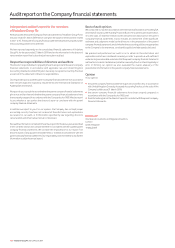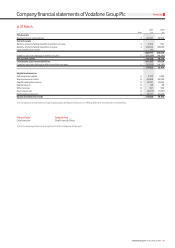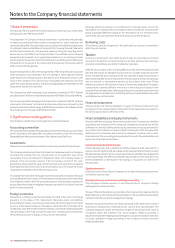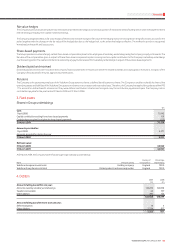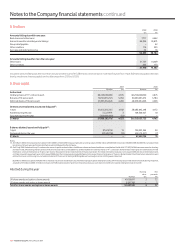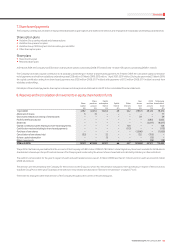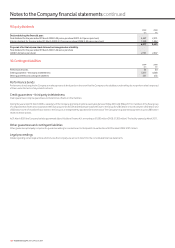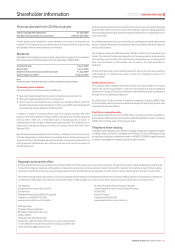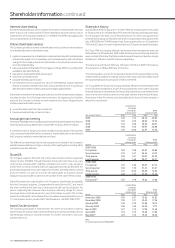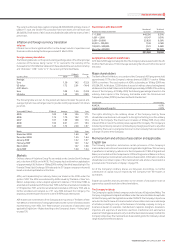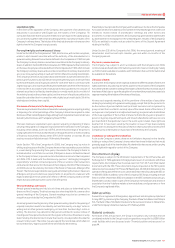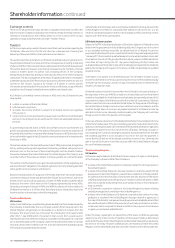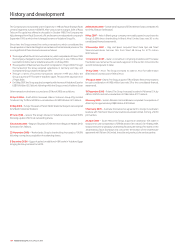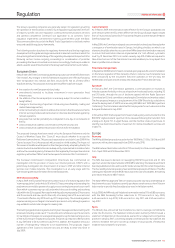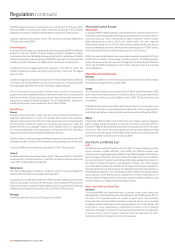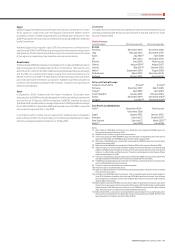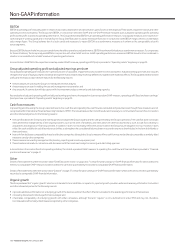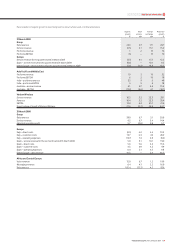Vodafone 2009 Annual Report Download - page 132
Download and view the complete annual report
Please find page 132 of the 2009 Vodafone annual report below. You can navigate through the pages in the report by either clicking on the pages listed below, or by using the keyword search tool below to find specific information within the annual report.
130 Vodafone Group Plc Annual Report 2009
Directors
The Company’s articles of association provide for a Board of directors, consisting
of not fewer than three directors, who shall manage the business and affairs of
the Company.
The directors are empowered to exercise all the powers of the Company subject to
any restrictions in the articles of association.
Under the Company’s articles of association, a director cannot vote in respect of any
proposal in which the director, or any person connected with the director, has a material
interest other than by virtue of the director’s interest in the Company’s shares or other
securities. However, this restriction on voting does not apply to resolutions (a) giving
the director or a third party any guarantee, security or indemnity in respect of
obligations or liabilities incurred at the request of or for the benefit of the Company, (b)
giving any guarantee, security or indemnity to the director or a third party in respect of
obligations of the Company for which the director has assumed responsibility under an
indemnity or guarantee, (c) relating to an offer of securities of the Company in which
the director participates as a holder of shares or other securities or in the underwriting
of such shares or securities, (d) concerning any other company in which the director
(together with any connected person) is a shareholder or an officer or is otherwise
interested, provided that the director (together with any connected person) is not
interested in 1% or more of any class of the company’s equity share capital or the voting
rights available to its shareholders, (e) relating to the arrangement of any employee
benefit in which the director will share equally with other employees and (f) relating to
any insurance that the Company purchases or renews for its directors or any group of
people, including directors.
The directors are empowered to exercise all the powers of the Company to borrow
money, subject to the limitation that the aggregate amount of all liabilities and
obligations of the Group outstanding at any time shall not exceed an amount equal
to 1.5 times the aggregate of the Group’s share capital and reser ves calculated in the
manner prescribed in the articles of association, unless sanctioned by an ordinary
resolution of the Company’s shareholders.
The Company can make market purchases of its own shares or agree to do so in the
future, provided it is duly authorised by its members in a general meeting and subject
to and in accordance with Section 166 of the Companies Act 1985.
In accordance with the Company’s articles of association, directors retiring at each
AGM are those last elected or re-elected at or before the AGM held in the third
calendar year before the current year. In 2005, the Company reviewed its policy
regarding the retirement and re-election of directors and, although it is not intended
to amend the Company’s articles of association in this regard, the Board has decided,
in the interests of good corporate governance, that all of the directors should offer
themselves for re-election annually.
No person is disqualified from being a director or is required to vacate that office by
reason of age.
Directors are not required, under the Company’s articles of association, to hold any shares
of the Company as a qualification to act as a director, although executive directors
participating in long term incentive plans must comply with the Company’s share
ownership guidelines. In accordance with best practice in the UK for corporate
governance, compensation awarded to executive directors is decided by a remuneration
committee consisting exclusively of non-executive directors.
In addition, as required by The Directors’ Remuneration Report Regulations, the
Board has, since 2003, prepared a report to shareholders on the directors’
remuneration which complies with the regulations (see pages 57 to 67). The report
is also subject to a shareholder vote.
Rights attaching to the Company’s shares
At 31 March 2009, the issued share capital of the Company was comprised of 50,000
7% cumulative fixed rate shares of £1.00 each and 52,483,872,615 ordinary shares
(excluding treasury shares) of US$0.113/7 each.
Dividend rights
Holders of 7% cumulative fixed rate shares are entitled to be paid in respect of each
financial year, or other accounting period of the Company, a fixed cumulative
preferential dividend of 7% per annum on the nominal value of the fixed rate shares.
A preferential dividend may only be paid out of available distributable profits which
the directors have resolved should be distributed. The fixed rate shares do not have
any other right to share in the Company’s profits.
Holders of the Company’s ordinary shares may, by ordinary resolution, declare
dividends but may not declare dividends in excess of the amount recommended by
the directors. The Board of directors may also pay interim dividends. No dividend may
be paid other than out of profits available for distribution. Dividends on ordinary
shares will be announced in pounds sterling. Holders of ordinary shares with a
registered address in a eurozone country (defined, for this purpose, as a country that
has adopted the euro as its national currency) will receive their dividends in euros,
exchanged from pounds sterling at a rate fixed by the Board of directors in accordance
with the articles of association. Dividends for ADS holders represented by ordinary
shares held by the depositary will be paid to the depositary in US dollars, exchanged
from pounds sterling at a rate fixed by the directors in accordance with the articles of
association, and the depositary will distribute them to the ADS holders.
If a dividend has not been claimed for one year after the date of the resolution passed
at a general meeting declaring that dividend or the resolution of the directors
providing for payment of that dividend, the directors may invest the dividend or use
it in some other way for the benefit of the Company until the dividend is claimed. If
the dividend remains unclaimed for 12 years after the relevant resolution either
declaring that dividend or providing for payment of that dividend, it will be forfeited
and belong to the Company.
Voting rights
The Company’s articles of association provide that voting on substantive resolutions
(i.e. any resolution which is not a procedural resolution) at a general meeting shall be
decided on a poll. On a poll, each shareholder who is entitled to vote and is present
in person or by proxy has one vote for every share held. Procedural resolutions (such
as a resolution to adjourn a General Meeting or a resolution on the choice of Chairman
of a general meeting) shall be decided on a show of hands, where each shareholder
who is present at the meeting has one vote regardless of the number of shares held,
unless a poll is demanded. In addition, the articles of association allow persons
appointed as proxies of shareholders entitled to vote at general meetings to vote on
a show of hands, as well as to vote on a poll and attend and speak at general meetings.
Holders of the Company’s ordinary shares do not have cumulative voting rights.
Under English law, two shareholders present in person constitute a quorum for
purposes of a general meeting, unless a company’s articles of association specify
otherwise. The Company’s articles of association do not specify otherwise, except
that the shareholders do not need to be present in person, and may instead be
present by proxy, to constitute a quorum.
Under English law, shareholders of a public company such as the Company are not
permitted to pass resolutions by written consent.
Record holders of the Company’s ADSs are entitled to attend, speak and vote on a
poll or a show of hands at any general meeting of the Company’s shareholders by the
depositary’s appointment of them as corporate representatives with respect to the
underlying ordinary shares represented by their ADSs. Alternatively, holders of ADSs
are entitled to vote by supplying their voting instructions to the depositary or its
nominee, who will vote the ordinary shares underlying their ADSs in accordance with
their instructions.
Employees are able to vote any shares held under the Vodafone Group Share
Incentive Plan and ‘My ShareBank’ (a vested share account) through the respective
plan’s trustees.
Holders of the Company’s 7% cumulative fixed rate shares are only entitled to vote on
any resolution to vary or abrogate the rights attached to the fixed rate shares. Holders
have one vote for every fully paid 7% cumulative fixed rate share.
Shareholder information continued


